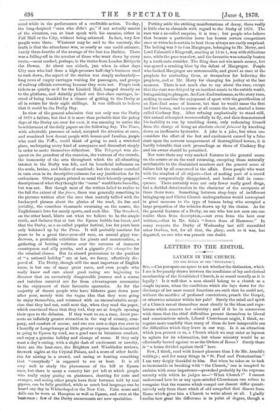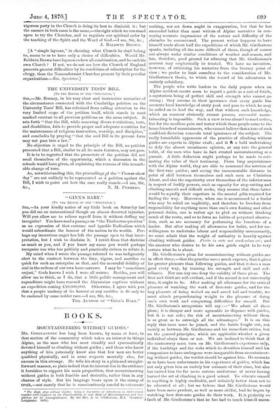LETTERS TO THE EDITOR.
LAYMEN IN THE CHURCH.
[TO THE EDITOR OF THE EPECTAT011.1
SIR,— Can you spare me space to ask whether the distinction, which I see is frequently drawn between the conditions of lay and clerical membership of the Established Church, is as sound morally as it is legally ? Is it well that a man should belong to a church as a simple layman, when the conditions which she lays down for the discharge of her most sacred functions are such that he could not, without the sacrifice of profound convictions, preach the Gospel, or otherwise minister within her pale? Surely the mind and spirit of a Church reveal themselves most clearly in the ideas and regu- lations which concern her ministry ; and if it be in connection with these that the chief difficulties present themselves to liberal and conscientious minds, Liberal Churchmen might, I think, re- cognize more candidly than many of them do how insuperable are the difficulties which they leave in our way. Is it an attraction which you present to us, a Church which we may enter as laymen to agitate for its reformation, but whose ministry would be as effectually barred against us as the Orders of Rome? Surely there is "a house divided against itself" here.
Few, I think, read with keener pleasure than I do Mr. Arnold's writings ; and for many things in "St. Paul and Protestantism" I am very deeply thankful to him. But when he takes us to task as inexcusable in breaking with "the Church," one is tempted to exclaim with some impatience—provoked probably by the supreme serenity with which he judges us—" What Church ?" I cannot understand how he or any open-minded Churchman can refuse to recognize that the reasons which compel our dissent differ quanti- tatively only from those which of old compelled that dissent from Rome which gives him a Church to write about at all. I gladly realize how great the difference is in point of degree, though a
vigorous party in the Church is doing its best to diminish it ; but the essence in both cases is the same,—the right which we too stand upon to try the Churches, and to regulate our spiritual order by the teaching of the Spirit and the Word of God.—I am, Sir, 8:c.,
J. BALDWIN BROWN.
[A "simple layman," in choosing what Church he shall belong to, seems to us to have only a choice of difficulties. Would Mr. Baldwin Brown have laymen eschew all combination, and be each his own Church ? If not, we do not see how the Church of England presents greater difficulties by its conditions of subscription for the clergy, than the Nonconformist Churches present by their peculiar organizations.—En. Spectator.]































 Previous page
Previous page